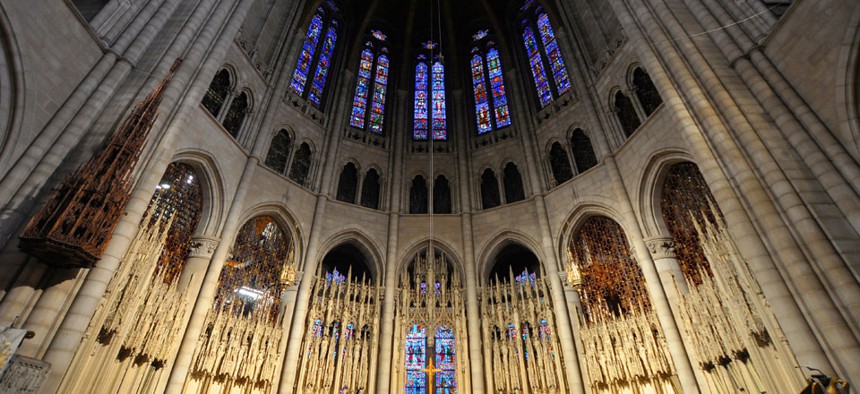
New York's Riverside Church jiawangkun/Shutterstock.com
OMB Updates Approaches to Faith-Based Projects
New working group asked to assure agency fairness and separation of church and state.
The White House budget office is clarifying its approach to federal partnerships with faith-based and neighborhood projects.
Agency heads have been asked to flesh out procedures according to a list of general principles identified in a 2012 report, according to guidance budget director Sylvia Mathews Burwell issued on Friday. A key goal is to ensure federal grants and partnerships with neighborhood groups are “not made on the basis of an organization’s religious affiliation, or because of a lack of any religious affiliation,” said an accompanying blog post from Melissa Rogers, director of the White House Office of Faith-Based and Neighborhood Partnerships.
“This guidance will help agencies to ensure that these partnerships respect religious freedom guarantees and work effectively for faith-based and other community providers, and the people in need they serve,” Rogers wrote.
The guidance builds on a 2010 executive order that itself was based on recommendations from an advisory group representing diverse groups, including the Union of Orthodox Jewish Congregations of America, the Religious Action Center of Reform Judaism, the United States Conference of Catholic Bishops, the Human Rights Campaign Foundation, the Baptist Joint Committee for Religious Liberty, the Incarnate Word Foundation, the Interfaith Alliance, the Institutional Religious Freedom Alliance, and Americans United for Separation of Church and State.
The 2010 directive, which amended a 2002 executive order, asked agencies to increase transparency by posting online regulations, guidance documents and policies that have implications for faith-based and other neighborhood organizations. Such postings should include a list of organizations receiving federal funds.
The order also directed agencies to provide clearer guidance regarding the principle that any explicitly religious activities must be separated, in time or location, from programs that receive direct federal support. “Religious organizations also will be assured that they may continue practices like selecting board members on a religious basis, and still receive federal funding for eligible activities,” Rogers explained in her blog post.
The new guidance, according to Rogers, asks agencies to implement the order using a 2012 report that defines, for instance, what constitutes “direct aid.” Agency heads are also asked to suggest ways to train employees and monitor relationships to avoid “entanglements” over religious issues.
A working group of agencies is set to reconvene to gauge progress within 120 days. It includes OMB, the departments of State, Justice, Interior, Agriculture, Commerce, Labor, Health and Human Services, Housing and Urban Development, Education, Veterans Affairs, and Homeland Security, as well as the Environmental Protection Agency, Small Business Administration, U.S. Agency for International Development, and the Corporation for National and Community Service.
The White House Office of Faith-Based and Neighborhood Partnerships was created in 2001 by President George W. Bush under the name White House Office of Faith-Based and Community Initiatives.
(Image via jiawangkun/Shutterstock.com)







